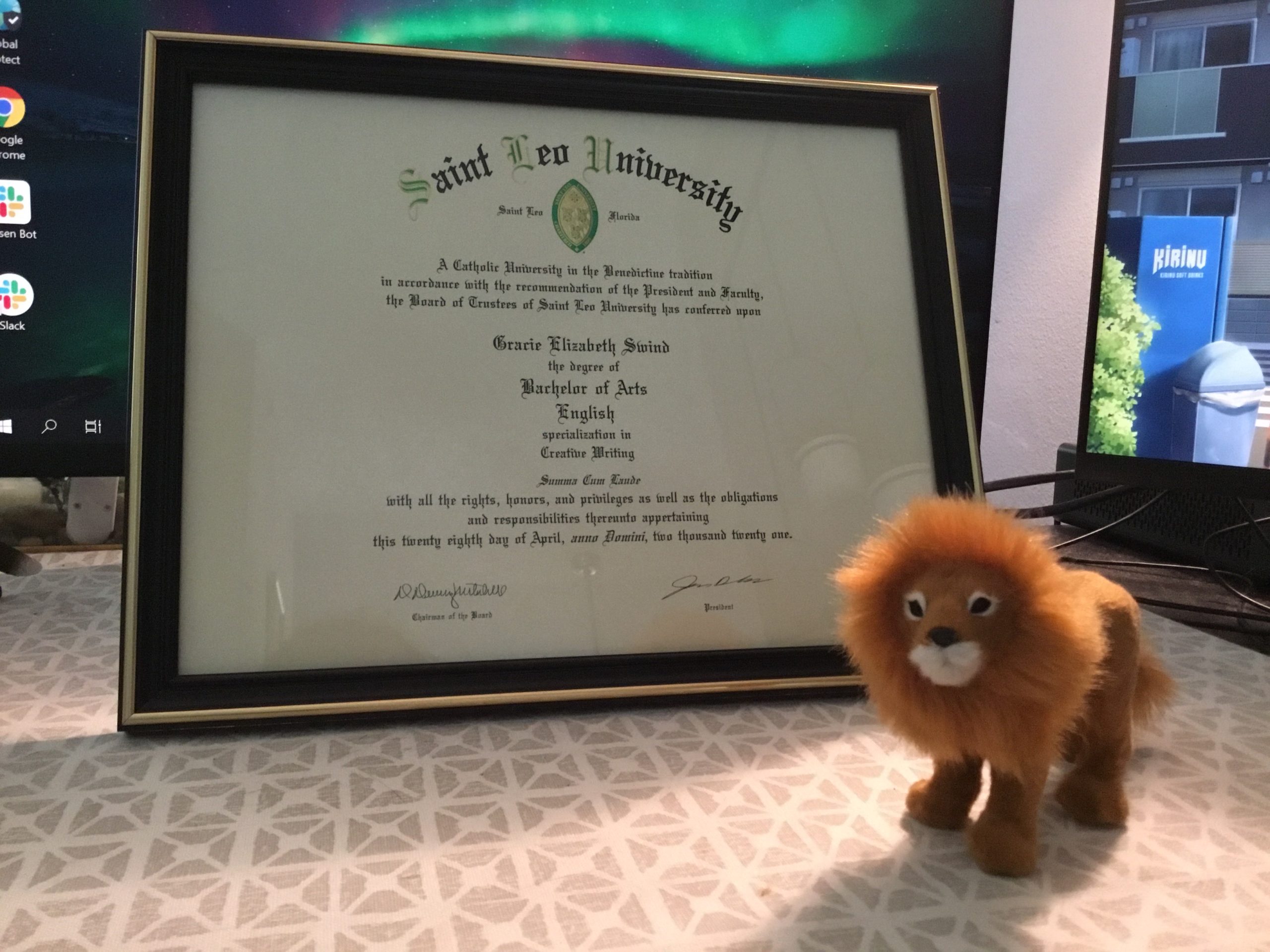By Gracie Swind, Former Managing Editor (Class of 2021)
Job hunting and interviewing is a brutal, exhaustive, fickle, and unforgiving mistress. As you apply, interview, and stomach inevitable rejections to a seemingly endless number of jobs, your mentality as a job hunter shifts and bigger questions arise.
An unyielding job hunt teaches you what’s important to you in your work life, personal life, employer, financial needs, and overall life satisfaction. I earned these lessons with months of applications, calls, interviews, rejections, and offers; I hope that by sharing these takeaways with you, you might be able to better guide your own job search and get a head start in thinking about what truly makes a job a good fit.
Utilize the scattershot approach.
Apply to a wide variety of positions in a number of different fields, not just in your target career field. Instead, search for positions that include experiences that will bleed into and support your future bid for an occupation in your career; think about what kind of transferrable skills and experiences would help you build your resume for your target job and seek to accumulate those now.
Understand what you value in an employer.
Aside from the job itself, it’s also important to know what kind of values and tendencies you look for in an employer. Communication, honesty, supportiveness, and approachability are values that I personally look for in employers.
Consider that an employer will be a reference for you in the long term, so choose an employer who you will be able to contact for references and recommendations. An uncommunicative or unapproachable employer will not only make your working life more difficult in the present, but they will also create future hurdles if you want to use that job experience on your résumé.
Know your worth and do your research.
It’s important when job-hunting to know and affirm your worth, do your research about jobs, and compare hourly rates to similar positions in a particular field. If you receive a job offer that does not offer a competitive or comparable pay rate, do not feel pressured to take it.
This is a lesson I learned at the very beginning of my job hunt, when I was offered a full-time managerial position in a retail chain that offered just barely more than a minimum hourly wage. If you encounter a lowball offer, you can always make a counteroffer to the employer with your reasoning clearly stated, but this does not always yield a higher offer in return; if an employer is willing to short-change you from the very beginning, they may be a difficult individual to work for and with and could have a lack of respect for their employees.
Understand what you value in your work-life balance.
Work-life balance is an incredibly important aspect of a job, and often your impression of how a particular job experience is going will unconsciously hinge on how your private life is affected. Consider the aspects of your work-life balance that you are willing to bend on and those that you are not.
For me, I place a high value on my sleep schedule and having regular work hours, so jobs that have irregular or late hours were not ideal for me. I also found, after working all day on Christmas Eve and missing nearly my entire evening church service, that being able to reserve time for family and spirituality were very also important to me.
Other factors to consider include the commute, working conditions, and job site location. One job I interviewed for offered good pay and manageable, regular hours, but the commute was over forty-five minutes from my home in an unsafe area, and the employee office and working conditions were compact and somewhat dangerous; the pay was not enough to make up for those factors, and so I declined the position when it was offered.
Read job ads and attend interviews with eyes wide open.
Multi-level marketing schemes – also called pyramid schemes – are not always easy to detect at first, and unfortunately, recently graduated college students are a prime target for MLMs. I encountered and even interviewed with an MLM during my job hunt, so I know firsthand that they aren’t always obvious or easy to spot.
The typical form of an MLM – traditionally known as a pyramid scheme – sees a person buying the MLM’s product, often clothes, jewelry, or food, in bulk to sell to consumers at a premium; this leaves the buyer on the hook to sell the merchandise or suffer a loss. However, this is not the only type of MLM structure that is utilized, and the others are often harder to notice.
Another such structure is the ‘smart circle,’ which has workers sell subscriptions to often faulty or inferior services in a door-to-door sales format. This type of MLM often disguises itself as a small business generically claiming to offer ‘advertising services.’
Smart circles promise swift promotions, the ability to build you own team, and six figure profit within a few years, all reliant on the amount of contracts or ‘applications’ that a particular worker can secure over a certain period of time. This type of MLM relies on trapping a majority of workers at the bottom wrung of the ladder; while it may seem easy for a worker to reach the amount of needed sales to move up into the next position, in reality, the worker ends up trapped at the bottom, their superior taking the majority of their commission pay and they themselves unable to get enough applications to ever rise beyond the status of a grunt.
Many MLMs won’t show their true colors until the interview, so it’s important to interview with small businesses and unknown companies on high alert for anything that seems amiss. When I interviewed at the MLM I encountered, I noticed many things that set off alarm bells.
The name of the company was different on their website, Indeed, and office suite number. I had a brief video meeting with the CEO – which is also a red flag – prior to the in-person interview, where he described the job as being a customer service position making cold calls to recently-lost clients of a prominent cell service company; when I interviewed in person, the job was suddenly a grassroots, door-to-door sales position for an obscure subscription delivery company.
The atmosphere was unsettlingly energetic and relaxed, with overly-cheerful pop music playing loudly in the reception and many happy, bubbly workers milling around the entrance. As I was leaving, I passed another person going in who asked me for directions to the suite, citing the company’s Indeed name;
this sort of en masse, batch interviewing is central to the smart circle format, as they need a constant supply of new workers for them to see profits.
Be wary of a job posting if it isn’t really clear what service or product the company offers, any company name information doesn’t match up, the job promises swift promotions and growth opportunities, the job description is generic, or if the company leaves out any information in the job ad citing ‘confidentiality.’ On their own, some of these issues may not point to a bigger problem, but I would recommend being wary if you encounter any of these sorts of trends, and definitely take a closer look if any one company displays more than one of these issues.
For a more in-depth look at MLMs, I recommend watching the Amazon Prime documentary series ‘LuLaRich,’ which I happened to watch just before I encountered the MLM in my own job hunt.
Finally, if you aren’t happy with your current job, never stop applying.
Even if you accept one position for the time being, never stop applying to other, better jobs, especially those in your field. The job you end up getting might not be the one that you did lots of research for or spent hours working on a custom cover letter for.
The job you end up getting, as was the case for me, may be the one that you apply for at midnight one night after returning from a late shift at your current job, your blood boiling from unfair treatment, poor working conditions, and missed family dinners. You might apply without a cover letter because it’s late at night and you don’t want to get out your computer, and you might not even remember that specific job when they call you, because you applied to a few other companies that night, too.
In the end, it doesn’t matter how you apply to the job you end up getting, all that matters is that you did. So, don’t stop applying.
Keep trying, keep pushing, keep putting yourself out there. Something will stick, and it’ll all have been worth it.











